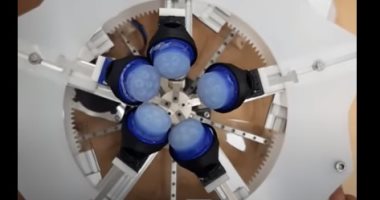
-
Published: 08 October 2023

The device can detect tumors at great depths and apply forces similar to those performed by humans through the use of sensor technology
Edited by| Hugh Gey
Science section - CJ journalist
London- October,8,2023
The team of the "Bristol Robotics Laboratory" in the UK Bristol Robotics laboratory has managed to develop a hand-like device equipped with sensors that use a force similar to that performed by humans to examine the breast and monitor lumps or tumors at great depths
The new robot could help diagnose breast cancer earlier and revolutionize testing in women
In this context, the University of Bristol said in a statement that "this innovation will revolutionize how women monitor their breast health by giving them easy access to electronic clinical breast examinations (CBEs) located in accessible and accessible places, such as pharmacies and health centers that provide accurate results.
The team that developed the innovation said that the" optimal goal " is to enable the device to detect lumps or tumors more accurately and at a deeper level than is possible by human touch, coupled with the availability of other technologies such as ultrasound.
George Jenkinson, a PhD student at the University and the lead author of the robot research said, "there are conflicting ideas about the usefulness of clinical breast examinations on the health outcomes of the population, and it is agreed that if performed well, it can be a very useful and risk-free diagnostic technique, and there have been few previous attempts to use technology to enhance the standard we are in a better position to do that".
"The first question that we would like to answer as part of this context is that it can be demonstrated whether a specialized palpation device has the necessary dexterity to sense the size and shape of a realistic breast,"he added.
The robot was made using holographic printing and tested on a replica of a volunteer breast from a research group at the Royal College of London made of silicone, which allowed the team to perform thousands of breast tests and examine hypothetical scenarios.
"So far, we have laid all the foundations and shown that the robot system we have developed has the necessary dexterity to conduct clinical breast tests, and we hope that in the future this will be able to really help diagnose cancers early,"Jenkinson continued.
The research team included a group of graduated and still undergraduate students, which is part of the Artemis Artemis (intelligent automated breast screening system) project funded by the Cancer Research UK Cancer Research UK.
In this context, the head of research communications at the charity Breast Cancer Now, Dr. kotrina timsinet, said that "it is very important to find innovative ways to help in the early diagnosis of breast cancer, and this new research constitutes an early stage in exploring whether a robot device in the future can conduct clinical breast examination, a task currently being performed by a healthcare professional, while this study is the first of its kind to explore this through the use of five sensors in one device, but it has not yet been tested on humans, as that there is no data showing whether it can detect new or abnormal changes in the breast, and therefore We need to understand more things before we know whether this device can be used in medical settings or not,"he said.
She added, "Currently, our focus should be on vital tools that we know help diagnose breast cancer early, namely going to breast screening appointments when the doctor requests it and undergoing periodic breast examinations, because these methods give people better chances for successful treatment and save lives from breast cancer, with 44 percent of women in the UK reluctant to undergo periodic breast examinations to monitor any possible signs or symptoms of breast cancer, and we should do more to empower and encourage every woman to get tested periodically, visit a doctor when she feels any concerns, and this is coupled with the government prioritizing and funding the breast testing program Because it has reached the brink after years of neglect, with test turnout at the lowest point in its history in England, this is extremely important to ensure that women have access to breast tests both today and in the future,"he said.
{source}<script async src="https://pagead2.googlesyndication.com/pagead/js/adsbygoogle.js?client=ca-pub-4474625449481215"
crossorigin="anonymous"></script>
<!-- moss test ad -->
<ins class="adsbygoogle"
style="display:block"
data-ad-client="ca-pub-4474625449481215"
data-ad-slot="6499882985"
data-ad-format="auto"
data-full-width-responsive="true"></ins>
<script>
(adsbygoogle = window.adsbygoogle || []).push({});
</script>{/source}
